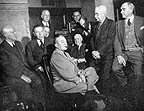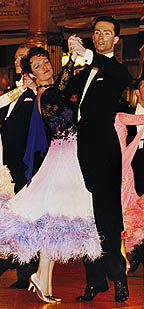Class Notes - June 7, 2000
Class notes features
From the Archives
 In january 1943, the university held its first winter commencement.
Shown listening to the ceremony on the radio at the Princeton Club of New
York are W. B. Parsons '92, W. McC. Vance '01, Stanley Williamson '01, S.
G. Etherington '06, Douglas Halsted '07, G. C. Wuerth '07, W. A. G. LeBoutillier
'10, G. F. Root '11, B. T. Woodle '11, and Alexander Breingan '12. In the
Chapel, where 360 degrees were conferred, President Dodds said, "Your
strength comes from the precious heritage which you are going forth to defend."
For the record, 80 percent of the graduates had been sworn in by some branch
of the armed services. Another 76 had left Princeton to enter war service,
and they were granted war certificates at the commencement exercises.
In january 1943, the university held its first winter commencement.
Shown listening to the ceremony on the radio at the Princeton Club of New
York are W. B. Parsons '92, W. McC. Vance '01, Stanley Williamson '01, S.
G. Etherington '06, Douglas Halsted '07, G. C. Wuerth '07, W. A. G. LeBoutillier
'10, G. F. Root '11, B. T. Woodle '11, and Alexander Breingan '12. In the
Chapel, where 360 degrees were conferred, President Dodds said, "Your
strength comes from the precious heritage which you are going forth to defend."
For the record, 80 percent of the graduates had been sworn in by some branch
of the armed services. Another 76 had left Princeton to enter war service,
and they were granted war certificates at the commencement exercises.
Back to full menu of Class Notes Features
Waltzing the days away
Addicted to dancing, Wendi Davies '86 takes a turn on floors around
the world
 Wendi Davies '86 has a hard time naming any alumni in
her profession. Then again, a career as a ballroom dancer, competitor, and
teacher wasn't what she had in mind when she entered Princeton. She focused,
instead, on the architecture department and the swimming pool.
Wendi Davies '86 has a hard time naming any alumni in
her profession. Then again, a career as a ballroom dancer, competitor, and
teacher wasn't what she had in mind when she entered Princeton. She focused,
instead, on the architecture department and the swimming pool.
"I was a tomboy, a real jock-if I had to wear a dress I hated it.
I swam on the swim team my freshman year. The guy I was dating at the time,
Jonathan Terdiman '85, asked what my parents did, and so I took him to a
competition."
Davies's mother and father were national ballroom competitors: Together
they ranked second in the U.S. from 1968 to 1972; in 1976, 1977, and 1978
her father won the national championship with Sandra Cameron.
"Terdiman thought it was cool. My mother offered to train us, and
I was looking for a competitive outlet so I was willing to give it a try.
We danced together through my junior year, then he graduated, and by then
we weren't dating anymore. I played waterpolo my junior spring and even
swam on the team again my senior year, but I had had it with water, and
I had grown addicted to dancing. The summer after I graduated I got an amateur
partner and the rest went from there."
Davies, who grew up in North Haledon, New Jersey, has ranked second nationally
and 13th in the World Competition. She now competes and teaches around the
world, performing the standards: waltz, tango, Viennese waltz, foxtrot,
and quickstep. She owns a dance studio, Ballroom on Fifth, in New York City
along with two other partners.
It was at Princeton that Davies decided she could merge her two interests-architecture
and athletics-on the dance floor. Ballroom is "so structural and a
lot of it is physics," she explains. "I wanted the athletic part
of it because I loved competing, and I find it challenging intellectually.
"Ballroom is becoming a big sport in college. There are 20 to 30
thousand participants in the collegiate programs," says Davies. "The
Ivy League schools love it because it is somewhat intellectual, technical,
and it's cool." This past April, she returned to Princeton to coach
a workshop for the ballroom team, now a club sport.
How does she define a day well spent? "A waltz on a good day. It
can be one of the best feelings . . . it just floats up."
-Kate Mattingly '93
Kate Mattingly is a freelance writer in New York.
Back to full menu of Class Notes Features
A tale of two guys and two movies
Broderick Johnson '90 and Andrew Kosove '92 learned from their flop
and now have a 10-picture deal with Warner
 If they'd pitched their story to Hollywood, no one would
have bought it. Two Princeton grads with no movie experience spend three
years perfecting a movie idea but get taken and wind up with nothing. Then,
at age 30 and 33 respectively, they (1) hook up with a legendary businessman
who bankrolls their own Hollywood production company, (2) spend $7 million
to make a movie that earns critical praise and $35 million at the box office,
and (3) sign an obscure actress to do their next movie only months before
she wins an Oscar. This story may not make it to the silver screen anytime
soon, but it's all too real for Broderick Johnson '90 and Andrew Kosove
'92.
If they'd pitched their story to Hollywood, no one would
have bought it. Two Princeton grads with no movie experience spend three
years perfecting a movie idea but get taken and wind up with nothing. Then,
at age 30 and 33 respectively, they (1) hook up with a legendary businessman
who bankrolls their own Hollywood production company, (2) spend $7 million
to make a movie that earns critical praise and $35 million at the box office,
and (3) sign an obscure actress to do their next movie only months before
she wins an Oscar. This story may not make it to the silver screen anytime
soon, but it's all too real for Broderick Johnson '90 and Andrew Kosove
'92.
Johnson, of Athens, Georgia, and Kosove, of suburban Philadelphia, both
studied economics at Princeton. The two met while doing community service
at Princeton and stayed in touch after Johnson graduated and went to work
on Wall Street. Kosove had planned to attend law school, but he got sidetracked
while researching tuition vouchers for his senior thesis. When Kosove heard
about Richard "Peewee" Kirkland, a basketball player and gangster
in New York, he thought his story might make a good movie. Kosove and Johnson
teamed up to option Kirkland's rights and spent more than three years working
with a Hollywood producer on the project. ("Although Kirkland was a
gangster, he was one of the most honorable men I've ever known," Kosove
says.)
In time, relations with the producer soured, and the movie never got
made. "On one level, it was not a good experience," Kosove says.
"On another level, it was phenomenal because it gave us the ability
to apply a lot of the skills we had used at Princeton to teach ourselves
the business."
While in Hollywood, Johnson and Kosove happened to meet Fred Smith, the
founder of Federal Express. Smith had been trying to break into the movie
business and needed distribution for a stalled film he'd bankrolled. Johnson
and Kosove volunteered to help him find distribution; in exchange, they
asked him to read their 220-page business plan for a Hollywood production
company. Smith liked what he saw, and with his financial backing, Alcon
Entertainment (named after a mythological archer who never missed his target)
was launched in January 1997.
Alcon was designed to be a different model for Hollywood. Usually studios
pay production companies a fee to line up the talent for a movie and to
handle the technical end; the studio pays the bills and gets most of the
profits as well as the rights to the picture. Alcon-and a small number of
other companies-turns that system on its head. Alcon pays the production
costs and forks over a fee to the studio to market and distribute the film
upon release. In exchange, Alcon keeps the profits and the copyright. The
advantage to the studio is minimized risk in an increasingly expensive and
risky industry. The advantage to Alcon is that they get to build a studio
on the cheap-and keep the rights to "content" that could become
increasingly valuable in the wired age. To further decrease its risks, Alcon-with
only 10 full-time employees-keeps its overhead low and sometimes allows
actors to invest in their own movies.
Alcon, which now gets 50 scripts a week, has made two films so far. The
first-Lost & Found, a romantic comedy starring David Spade and Sophie
Marceau-flopped. "The problem we had with Lost & Found was that
it tested very well with audiences, but we didn't have good marketability-we
couldn't sell David in a romantic comedy," Kosove says. "Now we've
learned to read both signals."
By contrast, My Dog Skip, a boyhood memoir starring Frankie Muniz of
Fox-TV's Malcolm in the Middle, has already made millions for Alcon. In
an unusual move, Johnson and Kosove test-released My Dog Skip in Austin,
Texas, and Columbus, Ohio, rather than releasing it simultaneously in 2,000
theaters nationwide, as many films do in order to beat the spread of negative
word-of-mouth. If My Dog Skip had flopped, Alcon could have sent it directly
to video, thus saving the marketing costs. Instead, it fared well, earning
$35 million, and Alcon learned enough to fine-tune its national marketing
campaign.
In March, Alcon inked a deal with Warner Brothers to make 10 films over
the next five years, mostly on mainstream subjects with budgets of $15 to
$50 million per film. The company is now gearing up for Affair of the Necklace,
a period drama slated for release in the fall of 2001. It stars Hilary Swank,
who signed up just months before she won a best-actress Oscar for Boys Don't
Cry.
Johnson and Kosove, who work 65-75 hours a week, say that Hollywood's
reputation for decadence is a bit overstated. "It's true-when there's
a party, it's a real party," Johnson says. "But Hollywood is also
a lot of hard work."
-Louis Jacobson '92
Louis Jacobson is a frequent contributor to paw.
Back to full menu of Class Notes Features
GO TO
the Table of Contents of the current issue
GO TO
PAW's home page
paw@princeton.edu
 In january 1943, the university held its first winter commencement.
Shown listening to the ceremony on the radio at the Princeton Club of New
York are W. B. Parsons '92, W. McC. Vance '01, Stanley Williamson '01, S.
G. Etherington '06, Douglas Halsted '07, G. C. Wuerth '07, W. A. G. LeBoutillier
'10, G. F. Root '11, B. T. Woodle '11, and Alexander Breingan '12. In the
Chapel, where 360 degrees were conferred, President Dodds said, "Your
strength comes from the precious heritage which you are going forth to defend."
For the record, 80 percent of the graduates had been sworn in by some branch
of the armed services. Another 76 had left Princeton to enter war service,
and they were granted war certificates at the commencement exercises.
In january 1943, the university held its first winter commencement.
Shown listening to the ceremony on the radio at the Princeton Club of New
York are W. B. Parsons '92, W. McC. Vance '01, Stanley Williamson '01, S.
G. Etherington '06, Douglas Halsted '07, G. C. Wuerth '07, W. A. G. LeBoutillier
'10, G. F. Root '11, B. T. Woodle '11, and Alexander Breingan '12. In the
Chapel, where 360 degrees were conferred, President Dodds said, "Your
strength comes from the precious heritage which you are going forth to defend."
For the record, 80 percent of the graduates had been sworn in by some branch
of the armed services. Another 76 had left Princeton to enter war service,
and they were granted war certificates at the commencement exercises. Wendi Davies '86 has a hard time naming any alumni in
her profession. Then again, a career as a ballroom dancer, competitor, and
teacher wasn't what she had in mind when she entered Princeton. She focused,
instead, on the architecture department and the swimming pool.
Wendi Davies '86 has a hard time naming any alumni in
her profession. Then again, a career as a ballroom dancer, competitor, and
teacher wasn't what she had in mind when she entered Princeton. She focused,
instead, on the architecture department and the swimming pool. If they'd pitched their story to Hollywood, no one would
have bought it. Two Princeton grads with no movie experience spend three
years perfecting a movie idea but get taken and wind up with nothing. Then,
at age 30 and 33 respectively, they (1) hook up with a legendary businessman
who bankrolls their own Hollywood production company, (2) spend $7 million
to make a movie that earns critical praise and $35 million at the box office,
and (3) sign an obscure actress to do their next movie only months before
she wins an Oscar. This story may not make it to the silver screen anytime
soon, but it's all too real for Broderick Johnson '90 and Andrew Kosove
'92.
If they'd pitched their story to Hollywood, no one would
have bought it. Two Princeton grads with no movie experience spend three
years perfecting a movie idea but get taken and wind up with nothing. Then,
at age 30 and 33 respectively, they (1) hook up with a legendary businessman
who bankrolls their own Hollywood production company, (2) spend $7 million
to make a movie that earns critical praise and $35 million at the box office,
and (3) sign an obscure actress to do their next movie only months before
she wins an Oscar. This story may not make it to the silver screen anytime
soon, but it's all too real for Broderick Johnson '90 and Andrew Kosove
'92.